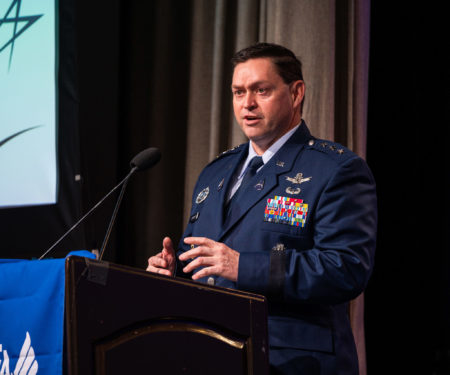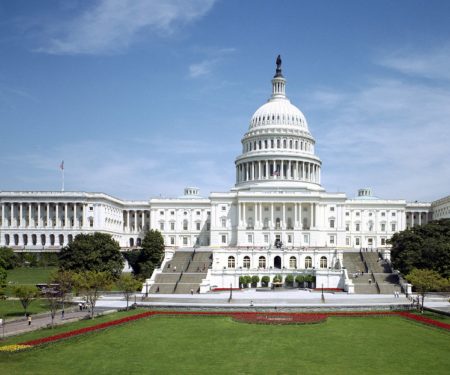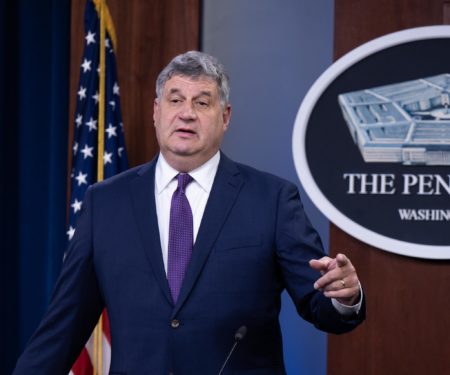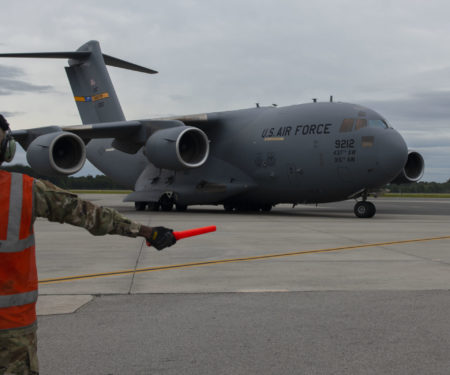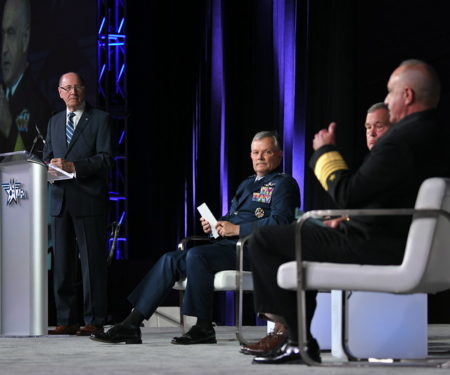Radar Sweep
Skoch Takes Over as AFA Board Chair
Bernie Skoch is the Air & Space Forces Association’s new chairman of the board, succeeding retired Chief Master Sergeant of the Air Force No. 14 Gerald Murray. Shock ran unopposed and was elected without objection during AFA’s National Convention leading up to the Air, Space & Cyber Conference in National Harbor, Md. He served 29 years in the Air Force in a variety of communications roles. After retirement, Skoch launched AFA’s CyberPatriot National Youth Cyber Education Program. As the national commissioner, he oversaw the growth of the program as it evolved into one of the most widely regarded and successful cyber-focused STEM programs in the nation.
‘It Has to Work’: Inside the Military’s Race to Solve an Ejection Seat Safety Conundrum
It was during a routine inspection in April that an Air Force technician found a single faulty cartridge actuated device in the ejection seat of an F-35 at Hill Air Force Base, Utah. The device—known colloquially as CAD—contained no magnesium powder, a necessary material for generating the explosive charge that allows a pilot to begin ejecting from an aircraft.
Infrastructure, Allies, and ‘One Space Effort’ Key to Keep US Ahead of China in Space: DIU Official
In order to stay ahead of China in the space domain, the U.S. needs to increase investment in its infrastructure and to develop stronger relationships with allies and partners, according to an official from the Pentagon’s Defense Innovation Unit. Steven Butow, DIU’s space portfolio director, said increasing investment in “both physical and digital infrastructure” and having strong ties to its allies will help in “building the space economy” of the U.S. and in times of war. It’ll also require bringing in all the different space-related efforts from agencies under one effort.
Senators Propose ‘China Grand Strategy’ Commission to Guide US Policy
A bipartisan group of 15 senators is seeking to create a commission tasked with formulating a “grand strategy” on China that avoids conflict with the world’s most populous nation while allowing the U.S. to pursue its interests. Sens. Angus King (I-Maine), John Cornyn (R-Texas), and Tim Kaine (D-Va.) said they would introduce legislation to create a China Grand Strategy Commission, which would be given two years to develop a whole-of-government approach guiding Washington’s relationship with Beijing.
Inside Violent Ian, a Hurricane-Hunter Pilot ‘Never Felt So Small’
The pilot has zipped through hurricanes for a decade, in an Air Force career that has spanned so many operations that it’s impossible for Maj. Kendall Dunn to recollect exactly how many sorties he has flown. His flight early Sept. 28, a mission to pierce the eye of Hurricane Ian and gather vital data for weather scientists, will probably stay with Dunn for some time, he said. And that is sort of the problem. “I kind of want to write this one out of my head so I can keep doing this job,” Dunn said in an interview, still coming down from what he described as the single most turbulent flight he has ever experienced. “We literally got rocked.”
Congress Reauthorizes DOD Innovation Grants With New China Safeguards
Congress renewed a small business innovation grant program heavily favored by the Pentagon with a series of reforms meant to address Republican skepticism, mere days before it was set to expire at the end of the fiscal year. The reauthorization follows months of uncertainty about the program’s future amid slow-moving negotiations to assuage concerns over abuse of the rewards process.
Air Force Awards Future Hypersonic Power Contracts to General Electric and Honeywell
As the Air Force sought to spend down its remaining fiscal 2022 funds before fiscal 2023 began Oct. 1, the service awarded future hypersonic power contracts to General Electric and Honeywell in response to white papers that the companies submitted. The Air Force awarded GE a nearly $18.6 million contract for Air Force Research Laboratory work on compact power generation for long-duration hypersonic vehicles. Honeywell won a nearly $15.3 million contract for AFRL work related to development and testing of a compact power generation system for long-duration and reusable hypersonic vehicles.
Space Force Studying Requirements for Cislunar Space Domain Awareness
The Space Force expects to know by the spring what capabilities it will need to carry out space domain awareness activities in cislunar space. Col. Marc Brock, commander of Space Delta 2, the unit responsible for space domain awareness for the Space Force, said a study is underway by the 19th Space Defense Squadron on what’s needed to monitor activities beyond geostationary orbit, called xGEO by the Space Force, and out to the moon.
US Space Surveillance Telescope in Australia Achieves Initial Operational Capability
The Australian Department of Defence and the U.S. Space Force declared initial operational capability for the Space Surveillance Telescope at Naval Communication Station Harold E. Holt, Australia. The SST is a military telescope that provides ground-based, broad-area search, detection, and tracking of faint objects in deep space to help predict and avoid potential collisions, as well as to detect and monitor asteroids.
National Space Council to Ask Industry for Input on New Space Rules
The National Space Council is planning to hold “learning sessions” with industry members to gather information on both new types of space missions and views about what space safety and sustainability rules might be required for those operations, according to Director of Commercial Space Policy Diane Howard. The input, she told the Advanced Maui Optical and Space Surveillance conference, will feed into the council’s work to develop a new framework of U.S. government rules and regulations for space activities that either are novel or currently fall between the cracks.
How Coffee Helped the Union Army Win the Civil War
When traitorous slaveholders led a rebellion in 1861 and attempted to throttle America’s young democracy, the Grand Army of the Republic had a secret weapon to crush the insurrectionists: Coffee. For Soldiers in the Union army, coffee was not only their preferred drink but the lifeblood of freedom’s fighting force.
